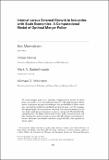Notice
This is not the latest version of this item. The latest version can be found at:https://dspace.mit.edu/handle/1721.1/136480.2
Internal versus External Growth in Industries with Scale Economies: A Computational Model of Optimal Merger Policy
Author(s)
Mermelstein, Ben; Nocke, Volker; Satterthwaite, Mark A; Whinston, Michael D
DownloadPublished version (2.659Mb)
Publisher Policy
Publisher Policy
Article is made available in accordance with the publisher's policy and may be subject to US copyright law. Please refer to the publisher's site for terms of use.
Terms of use
Metadata
Show full item recordAbstract
© 2019 by The University of Chicago. We study merger policy in a dynamic computational model in which firms can reduce costs through investment or through mergers. Firms invest or propose mergers according to the profitability of these strategies. An antitrust authority can block mergers at some cost. We examine the optimal policy for an antitrust authority that cannot commit to its future policy and approves mergers as they are proposed. We find that the optimal policy can differ substantially from a policy based on static welfare. In general, antitrust policy can greatly affect firms’ investment behavior, and firms’ investment behavior can greatly affect the optimal antitrust policy.
Date issued
2020Journal
The Journal of Political Economy
Publisher
University of Chicago Press